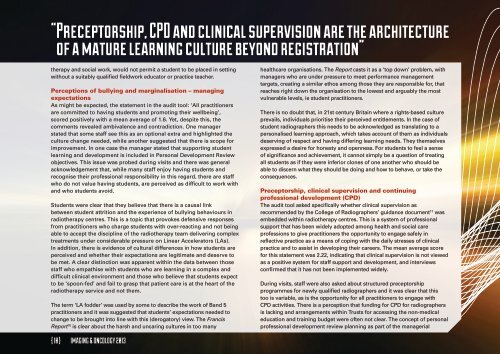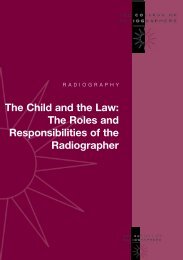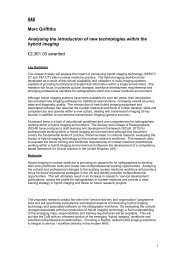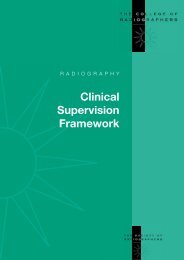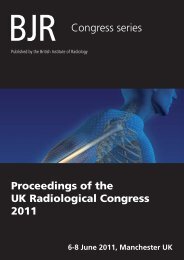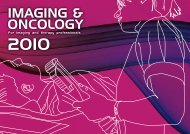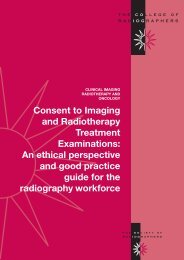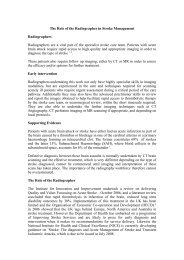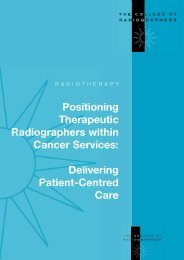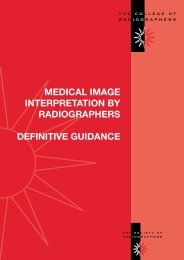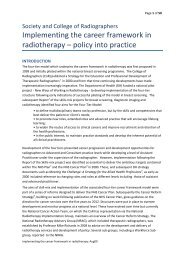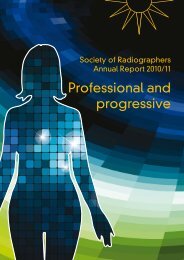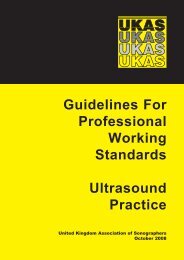Imaging & Oncology - Society of Radiographers
Imaging & Oncology - Society of Radiographers
Imaging & Oncology - Society of Radiographers
Create successful ePaper yourself
Turn your PDF publications into a flip-book with our unique Google optimized e-Paper software.
“Preceptorship, CPD and clinical supervision are the architecture<br />
<strong>of</strong> a mature learning culture beyond registration”<br />
therapy and social work, would not permit a student to be placed in setting<br />
without a suitably qualified fieldwork educator or practice teacher.<br />
Perceptions <strong>of</strong> bullying and marginalisation – managing<br />
expectations<br />
As might be expected, the statement in the audit tool: ‘All practitioners<br />
are committed to having students and promoting their wellbeing’,<br />
scored positively with a mean average <strong>of</strong> 1.6. Yet, despite this, the<br />
comments revealed ambivalence and contradiction. One manager<br />
stated that some staff see this as an optional extra and highlighted the<br />
culture change needed, while another suggested that there is scope for<br />
improvement. In one case the manager stated that supporting student<br />
learning and development is included in Personal Development Review<br />
objectives. This issue was probed during visits and there was general<br />
acknowledgement that, while many staff enjoy having students and<br />
recognise their pr<strong>of</strong>essional responsibility in this regard, there are staff<br />
who do not value having students, are perceived as difficult to work with<br />
and who students avoid.<br />
Students were clear that they believe that there is a causal link<br />
between student attrition and the experience <strong>of</strong> bullying behaviours in<br />
radiotherapy centres. This is a topic that provokes defensive responses<br />
from practitioners who charge students with over-reacting and not being<br />
able to accept the discipline <strong>of</strong> the radiotherapy team delivering complex<br />
treatments under considerable pressure on Linear Accelerators (LAs).<br />
In addition, there is evidence <strong>of</strong> cultural differences in how students are<br />
perceived and whether their expectations are legitimate and deserve to<br />
be met. A clear distinction was apparent within the data between those<br />
staff who empathise with students who are learning in a complex and<br />
difficult clinical environment and those who believe that students expect<br />
to be ‘spoon-fed’ and fail to grasp that patient care is at the heart <strong>of</strong> the<br />
radiotherapy service and not them.<br />
The term ‘LA fodder’ was used by some to describe the work <strong>of</strong> Band 5<br />
practitioners and it was suggested that students’ expectations needed to<br />
change to be brought into line with this (derogatory) view. The Francis<br />
Report 10 is clear about the harsh and uncaring cultures in too many<br />
healthcare organisations. The Report casts it as a ‘top down’ problem, with<br />
managers who are under pressure to meet performance management<br />
targets, creating a similar ethos among those they are responsible for, that<br />
reaches right down the organisation to the lowest and arguably the most<br />
vulnerable levels, ie student practitioners.<br />
There is no doubt that, in 21st century Britain where a rights-based culture<br />
prevails, individuals prioritise their perceived entitlements. In the case <strong>of</strong><br />
student radiographers this needs to be acknowledged as translating to a<br />
personalised learning approach, which takes account <strong>of</strong> them as individuals<br />
deserving <strong>of</strong> respect and having differing learning needs. They themselves<br />
expressed a desire for honesty and openness. For students to feel a sense<br />
<strong>of</strong> significance and achievement, it cannot simply be a question <strong>of</strong> treating<br />
all students as if they were inferior clones <strong>of</strong> one another who should be<br />
able to discern what they should be doing and how to behave, or take the<br />
consequences.<br />
Preceptorship, clinical supervision and continuing<br />
pr<strong>of</strong>essional development (CPD)<br />
The audit tool asked specifically whether clinical supervision as<br />
recommended by the College <strong>of</strong> <strong>Radiographers</strong>’ guidance document 17 was<br />
embedded within radiotherapy centres. This is a system <strong>of</strong> pr<strong>of</strong>essional<br />
support that has been widely adopted among health and social care<br />
pr<strong>of</strong>essions to give practitioners the opportunity to engage safely in<br />
reflective practice as a means <strong>of</strong> coping with the daily stresses <strong>of</strong> clinical<br />
practice and to assist in developing their careers. The mean average score<br />
for this statement was 2.22, indicating that clinical supervision is not viewed<br />
as a positive system for staff support and development, and interviews<br />
confirmed that it has not been implemented widely.<br />
During visits, staff were also asked about structured preceptorship<br />
programmes for newly qualified radiographers and it was clear that this<br />
too is variable, as is the opportunity for all practitioners to engage with<br />
CPD activities. There is a perception that funding for CPD for radiographers<br />
is lacking and arrangements within Trusts for accessing the non-medical<br />
education and training budget were <strong>of</strong>ten not clear. The concept <strong>of</strong> personal<br />
pr<strong>of</strong>essional development review planning as part <strong>of</strong> the managerial<br />
{ 10 } IMAGING & ONCOLOGY 2013


